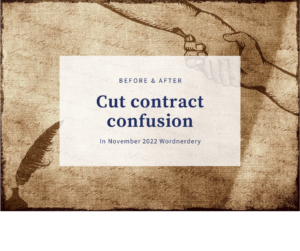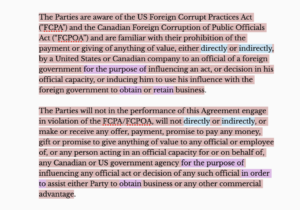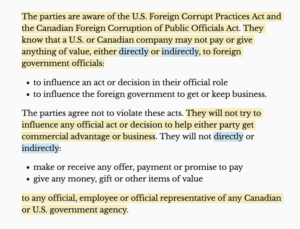 In the old days, a handshake was your contract.
In the old days, a handshake was your contract.
Today, the hands involved belong to lawyers, and they are all over the simplest of contracts. Unfortunately, as Ohio Judge Mark P. Painter says, “Most legal writing is atrocious.”
Forget short, crisp sentences. One reason is that lawyers keep adding qualifiers to tighten what a contract does or does not cover. Whoops, last time we only said “cancel.” Maybe it should be “cancel and annul.” No, we should make it “cancel, annul, and set aside.”
Sentences are long, strung together with multiple commas and semicolons before they meander to the end. Often, they’re also needlessly written in ALL CAPS. Words are long, too, bracketed by many “heretofores” and “hereinafters” and such.
The result is “a dense, overly lengthy contract that is loaded with legal jargon and virtually impossible for a non-lawyer to understand,” says Shawn Burton. He was the general counsel for GE Aviation’s digital services unit when he led the charge to simplify contracts.
The November issue of my newsletter, Wordnerdery, takes a look at the legal wording about bribery in a client’s one-size-fits-all contract. Never mind that it doesn’t apply to me, since I don’t deal with foreign governments:

With a legal contract, you want everyone signing it to understand what they’re signing. I ran it through some readability stats, and Storytoolz gives it a mythical grade 38 and a reading “ease” of minus 18.2/100. That’s off the scale of being not just difficult but extremely difficult to read. The Hemingway app agrees, shown by the sea of pinky-red. The whole piece rings in at a post-graduate level, the level of “light reading” you find in academic journals.
I did four things to take it from a post-graduate level to a more reader-friendly grade 7:
- Break up long sentences. Studies show that an average of 14 words means up to 90% of readers understand the sentence. More than 43, you’re looking at zero to 9%. The two sentences in this piece average 89.5 words.
- Use shorter, familiar, less formal words. Choose “help” over “assist,” “get” over “obtain,” “role” over “capacity.”
- Replace wordy phrases with simpler options. I chose “they may not pay” over “the prohibition of their payment” and “to” in place of “for the purpose of.”
- Use bulleted lists, headings and subheadings, graphics and white space to make a block of dense text more appealing.
Using these those four tactics resulted in this “after:”

The yellow highlights show there are still some complex sentences, but they are an improvement from the red. The Hemingway app gives this a Grade 7 (“Good”). Storytoolz gives it a Flesch Reading Ease of 64.8 out of 100, considered plain English. Average sentence length is 10.4 words and no sentences are very hard to read. The edits also trimmed the block of writing by almost 25%.
Of course, when legal terms are involved, you need the lawyers to read through any simplified text to make sure it still covers the appropriate rears. That’s what GE Aviation did in the case mentioned earlier, and produced simplified contracts that led to a 60% decrease in the time needed to negotiate them.
Have you seen a “before” piece of writing that begs for an “after”? Please share. I’m always looking for good (bad) examples.
Wordnerdery is a quick read about words, effective/expressive writing, newsletters and more. Are you a subscriber yet? If yes, thanks for reading! If not, you can sign up right now. In keeping with Canadian and American anti-spam laws – and just plain good manners – you can easily unsubscribe any time.
